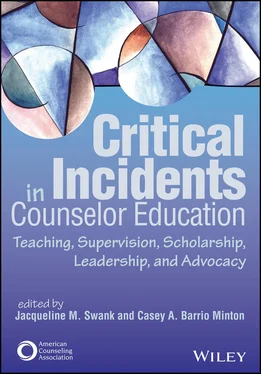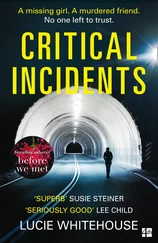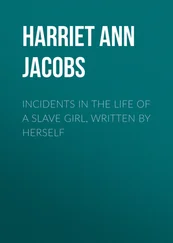Dynamics Related to Diversity and Inclusion
The counselor education curriculum must include clear and specific attention to the Multicultural and Social Justice Counseling Competencies (MSJCC; Ratts et al., 2015). The CACREP Standards (CACREP, 2016) require attention to the MSJCC in programs’ admission processes, in the social and cultural diversity core area, and throughout other core areas, an expectation for infusion that is echoed in the ACA Code of Ethics (ACA, 2014). All counselor educators must have skills for facilitating growth in the MSJCC and broaching cultural issues and dynamics within programs at large. “Whose Cultural Competence? Students’ Needs in Multicultural Courses” features a multicultural counseling course instructor whose attempt to meet a white student in their developmental space raises questions among peers of color regarding how their needs are met in the course. Likewise, “A Cohort Divided: Navigating Tensions Related to Race and Ethnicity” illustrates how dynamics regarding students’ race and ethnicity can play out even in coursework not expressly focused on cultivation of the MSJCC. In both cases, instructors need to navigate tensions related to student dispositions and development.
At times, students will demonstrate dispositions that raise significant questions regarding their ability to work with diverse clients. Even when not nested within “the” multicultural course, instructors have a responsibility to respond in a timely, ethical manner. “I Need a New Partner: Addressing Cultural Encapsulation and Racism” features a student who requests a new partner for skills practice because she has difficulty understanding her peer’s accent and cultural experiences. The doctoral student facilitator and instructor work to respond to the white student; however, they struggle to address the needs and experiences of the student of color.
Finally, the very nature of adult learning and of self-growth exercises inherent in counselor education can create situations in which students and faculty members feel connected with each other. This dynamic is compounded given the apprenticeship nature of relationships between doctoral students and faculty members. “Interacting With Me: Title IX and Faculty-Student Consensual Relationships” features a case in which a faculty member and doctoral student develop an increasingly flirtatious, personal relationship that ends in a Title IX complaint. Although university policy does not disallow such connections, the case raises important questions regarding boundaries, modeling, and aspirational ethics.
A final set of critical incidents encountered by counselor educators feature instructor preparedness and competence to engage teaching assignments. Many established counselor educators never engaged in sustained study of teaching and learning. Rather, they use their understanding of human development and relationships to navigate the teaching and learning process, often becoming highly skilled instructors. Although written before the coronavirus pandemic, “Embracing the Digital World: Instructor Preparedness for Online Delivery” highlights a critical issue experienced by the majority of counselor educators in 2020: expectations to move courses online with no or minimal preparation in online teaching and learning.
An additional issue related to instructor preparedness relates to balancing counselor-first and specialty identities. Many counselor educators develop specialty skills in one work setting (e.g., clinical mental health counseling, school counseling) yet teach core curricular coursework for students as a whole. In addition, last-minute budget or personnel issues may force counselor educators to teach courses for which they have little specialty expertise, creating tensions regarding scope of practice. This raises important questions regarding how instructors can ethically and competently help students apply material to their specialty areas. “Does It Apply to Me? Instructor Competency to Teach Specialty Courses” features a counselor educator who helps his department by teaching fieldwork courses outside his specialty area.
Even when they are well prepared in teaching methods and content, counselor educators experience tensions related to intersections of best practice and real-world practice. Often counselor educators lean on guest speakers to help make these connections. At times, however, guest speakers may inadvertently promote problematic practices. In “Something to Share: Promoting Unethical or Illegal Practice,” an instructor must decide how to respond when a protégé discloses a well-intentioned yet fraudulent payment practice.
Section 1 Student Engagement and Dispositions
Chapter 1
I Don’t Have a Clue: Responding to Unprepared or Unengaged Students
Jonathan H. Ohrt and Kathryn P. Linich
2014 ACA Code of Ethics Standards Addressed
F.7.a. Counselor Educators
F.9.a. Evaluation of Students
• • •
During his first semester teaching in a counselor education program, Professor O had been very excited for every class. He had spent hours preparing and updating handouts, developing experiential activities, and reviewing videos to show in class. On the day of class, he would review assigned readings to make sure he was up to date on the material. Although he did not spend nearly as much time preparing for courses currently, he continued to be enthusiastic about teaching and was very well prepared to engage with students. He hoped that students shared his enthusiasm and were equally prepared to engage in a shared learning experience.
Professor O primarily adhered to a humanistic (C. R. Rogers, 1969) and experiential (Kolb, 1984) teaching philosophy. He tried to facilitate warm, empathic, genuine, and trusting relationships with students. He attempted to facilitate an open environment in which students felt comfortable sharing their perspectives and enjoyed inquiring about course topics within a learning community. Professor O viewed student learning as an active process that included both cognitive and affective components. He believed students learned best by doing, reflecting, and trying new approaches.
On the first day of class, Professor O reviewed the syllabus and discussed requirements, including reading and assignments. He explained that he would not lecture directly from the book and expected that students would read and be prepared to discuss the content. Professor O emphasized his belief that active learning was most helpful and class was most enriching when everyone was engaged. Professor O liked to start each class with a check-in and a brief discussion of students’ perceptions of the topic. For example, he might ask about personal or professional experiences related to the topic or how the topic related to other aspects of counseling. In the first few weeks of class, he often facilitated brainstorming activities to engage the class in discussion.
One particular semester, Professor O taught the course Critical Issues in School Counseling. The course was an overview of current issues and concerns school counselors encounter. The content for the class session included environmental risk factors K–12 students face related to academics and overall well-being. Professor O started class by asking students to share some thoughts about the reading. He inquired about which risk factors surprised them most and how they believed school counselors could help prevent student distress related to them. Although he typically started class this way, the discussion during this class related more closely to concepts covered in the required reading.
After about a minute of observing the glazed looks on students’ faces, Professor O realized most were unsure about how to answer the question because they could not recall specific risk factors in the reading. In an attempt to encourage participation, he half-jokingly reminded them “Participation is 15% of your grade—let’s make sure we all get our points today.” A few of the students laughed nervously while others continued to stare with blank faces. After a few more moments of silence, he asked, “Is any of this ringing a bell?” He still did not get a response. It became clear that students either had not completed the assigned readings ahead of time or did not comprehend the material well enough to share their perspectives.
Читать дальше










